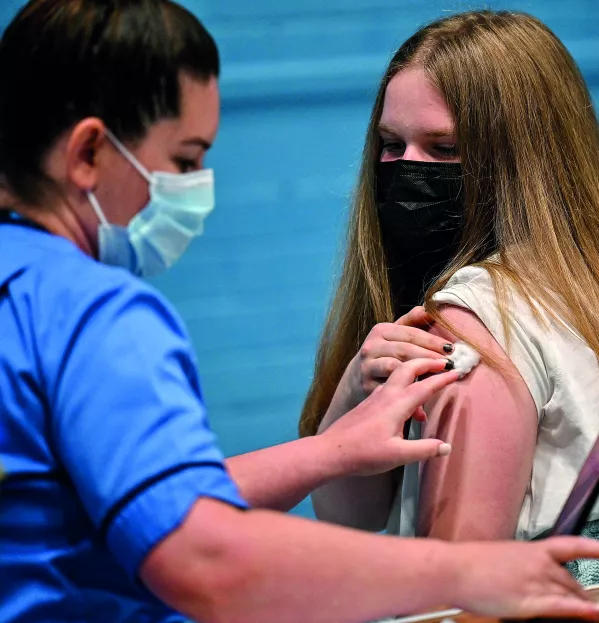Sturgeon swimming in ebb and flow of vaccination advice

On 27 July, Scotland’s first minister, Nicola Sturgeon, was getting a grilling from a journalist for failing to vaccinate teenagers over the summer, given that bringing together thousands of unvaccinated young people could be seen as “a Petri dish for another wave of Covid”.
She said then that vaccinating without the blessing of the Joint Committee on Vaccination and Immunisation (JCVI) would have been “if I can say this quite mildly, a very controversial thing for us to have done”.
The pressure, though, has been building on the JCVI to give the green light to the vaccination of 12- to 15-year-olds, especially in Scotland, where the schools went back at various points in August and Covid-19 cases have been rising, and where increasing numbers of students are off school for Covid-related reasons.
At a more recent Covid-19 media update - this time on 27 August - Sturgeon said: “Assuming we’ve got advice saying it’s safe to do, I would really like to get on with vaccinating
12- to 17-year-olds as quickly as we possibly can.”
But then, on Friday of last week (3 September), while the JCVI extended the vaccination to a further 200,000 12- to 15-year-olds with specific underlying conditions, it decided that not all those aged 12-15 should be vaccinated.
There was some wiggle room. The JCVI said in its statement that it looks at “health benefits and risks of vaccination” and not “in-depth considerations on wider societal impacts, including educational benefits”, and that the [UK] government “may wish to seek further views on the wider societal and educational impacts from the chief medical officers (CMOs) of the four nations”.
Should young teenagers be given the Covid vaccine?
At the time of writing, the conclusion of those discussions had yet to be made public but Sturgeon had confirmed in a tweet that the CMOs had indeed been asked to “consider wider issues, such as educational impact, in relation to vaccination of all 12- to 15-year-olds and offer further advice as quickly as possible”.
For its part, the JCVI concluded that “the benefits from vaccination are marginally greater than the potential known harms” for the age group, but then went on to say: “The margin of benefit, based primarily on a health perspective, is considered too small to support advice on a universal programme of vaccination of otherwise healthy 12- to 15-year-old children at this time.”
It said that, in the longer term, there might be more certainty about the potential adverse reactions but that “such data may not be available for several months”.
So, why is the Scottish government keen to get this age group vaccinated? The key argument is that vaccination is seen as a means of limiting any further disruption to children’s education.
Interestingly, though, the JCVI has pointed out that a mass vaccination programme “is likely to be disruptive to education in the short term, particularly if school premises are used for vaccination”.
It also highlighted the potential for a Covid-19 vaccine programme to impact on the efficiency of rollout of the flu vaccine and for adverse reactions to vaccination, such as fevers, to “lead to time away from education for some individuals”.
However, with the weekly update of the school attendance statistics, due yesterday, likely to show another leap in the number of children off school in Scotland as a result of Covid, the question the government is likely to be homing in on is this: will vaccination lead to more time off school than the virus itself?
If the CMOs decide that vaccination is a means to minimise disruption to schooling, then Scottish teenagers could yet find themselves a part of the largest vaccination programme in British history.
But for Sturgeon, that would be a change of emphasis, given that, back at that media Covid briefing on 27 July, she said: “If getting the virus is more dangerous than the vaccine, my view would be … the answer should be to vaccinate. And if getting the vaccine is more dangerous than
the virus, then the answer would be: don’t vaccinate.”
That question has been answered by the JCVI and its conclusion was not to vaccinate - at least not yet.
Emma Seith is a reporter for Tes Scotland. She tweets @Emma_Seith
This article first appeared in the 10 September 2021 edition of Tes Scotland
You need a Tes subscription to read this article
Subscribe now to read this article and get other subscriber-only content:
- Unlimited access to all Tes magazine content
- Exclusive subscriber-only stories
- Award-winning email newsletters
Already a subscriber? Log in
You need a subscription to read this article
Subscribe now to read this article and get other subscriber-only content, including:
- Unlimited access to all Tes magazine content
- Exclusive subscriber-only stories
- Award-winning email newsletters



